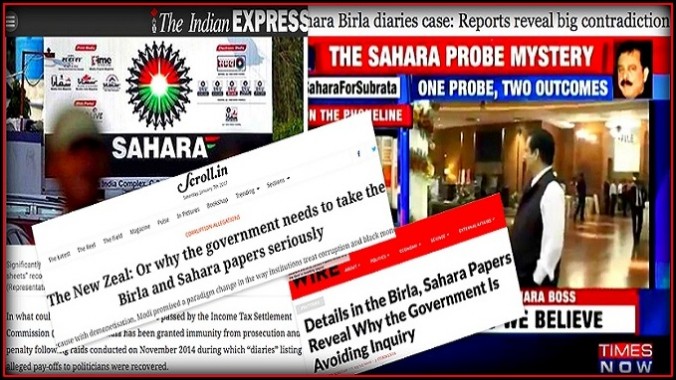The Sahara-Birla papers: such reluctant coverage!
Some scams galvanise the media, some don’t.
When the Indian Express reported earlier this week that the Income Tax Settlement Commission (ITSC) had granted Sahara India immunity from prosecution on the basis of just three hearings—and just three days after the last hearing was concluded—it was a sensational follow up to a case which the media has pretty much stayed away from investigating on its own.
The paper added that usually the Commission is given 18 months to pass a final order after its hearings. An order after 3 days it suggested, was unusual. Sahara had pleaded that the papers offered as evidence of pay-offs it had made to politicians did not have “evidentiary value.” The ITSC rejected this argument first, and then readmitted the company’s plea in September and accepted its argument. The following day the Express reported that Sahara’s expense claim to the Income Tax panel was 100 times that of its ROC filing.
The case relates to pay offs allegedly made to several politicians including Narendra Modi when he was Gujarat CM. Two separate sets of papers obtained from income tax raids on two corporate groups --The Sahara group and the Aditya Birla group—are in circulation. The Sahara papers were leaked in 2016 to the media and others. They were circulated anonymously to several journalists in the latter half of 2016, many of whom chose not to probe them.
Those named in these as recipients of payoffs included Shivraj Singh Chouhan, the chief minister of Madhya Pradesh; Raman Singh, the chief minister of Chhattisgarh; Narendra Modi when he was Gujarat CM, Shaina NC, the treasurer for the Bharatiya Janata party in Maharashtra and; Sheila Dikshit, the former chief minister of Delhi, but over a hundred politicians are mentioned between the two sets of papers.
While leads on this potential scam have been coming from lawyer Prashant Bhushan and the NGO Common Cause, the response of most of the media since November has been confined to reporting the story through the responses of Opposition politicians. On November 15, the Hindu had carried a report by Josy Joseph titled “Bhushan Seeks Investigation into ‘Political Payouts'” but without naming Modi or other prominent politicians.
And after the latest Express story, there has been scattered reporting of the ITSC order, but nobody has been galvanized into following up this case even now. Since November when the story became public the reporting of it has been remarkably circumspect, perhaps because of its defamatory implications. And it has been spectacularly under-investigated.
In December the Supreme Court had cautioned the NGO Common Cause against making unsubstantiated allegations against constitutional functionaries, including Prime Minister Narendra Modi, saying it would not order an inquiry on the basis of Income Tax papers relating to raids at Aditya Birla Group and Sahara companies unless there was credible material to suggest illegal payoffs to politicians. Its first response to Common Cause in November was also along the same lines.
“How will a constitutional authority function if you are going to make such allegations? We don’t see even the smallest material to substantiate your accusations,” the bench of Justices J S Khehar and Arun Mishra told advocate Prashant Bhushan, appearing for Common Cause, on December 14.
Did journalists decide not to respond because the evidence was not credible? Journalist Paranjoy Guha Thakurta (who is on the governing council of Common Cause) wrote a long piece in the Economic and Political Weekly and Caravan published at the end of November says in that that after he got the bundle of papers pertaining to Sahara he asked around and found that at least 20 other had them, and some even offered him documents that they did not possess at that time. Asked why they had not filed reports based on the documents they said they were unsure of its veracity. One even told him that he knew of the cover up plan the government had.
Guha Thakurta writes that on November 3 he spoke to the income tax officer investigating the case who said she was on leave and was not authorized to speak to the media.
Meanwhile the first Indian Express report on the income tax angle regarding the Birla papers by Ritu Sarin and Pragya Kaushika appeared on November 16 after Delhi CM Arvind Kejriwal brought it up in the Delhi Assembly. (The paper said it had first reported this development on January 15, 2015). Kejriwal said that a voluminous appraisal report running into “thousands of pages” on the papers pertaining to Sahara has been prepared and was being looked into by an assessment officer.
The next day, 17 November, Guha Thakurta e-mailed and wrote letters to Modi, Chouhan, Singh, Shaina N C and Dikshit, seeking their responses to the information contained in the documents which the income tax department seized during a raid it conducted on various premises of the Sahara India Group in the national capital region on 22 November 2014.
When no response was received from any of them he went ahead with publication of the EPW and Caravan reports on November 28, detailing what the papers contained. The story also linked to some of the documents.
While the Economic and Political Weekly and The Wire have responded to the story with alacrity, much of mainstream media has been remarkably circumspect, following the developments only through the assertions of Opposition leaders. Perhaps because of the Supreme Court’s November observation that better evidence was required to order a probe. Followed by its December reiteration that the court could not see the smallest evidence to merit ordering an investigation into this case.
But now, thanks to the Express, there is hard evidence that the government is moving with alacrity to discredit the evidence in this case. Will Google searches on media coverage then continue to be spectacularly sparse?
